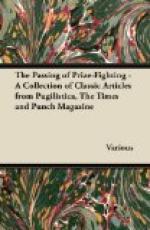Lucasta, prideful times they were
When first it came to pass
That on each shoulder I might bear
A little star of brass.
And when by reason of my zeal
I was awarded twain,
’Twas not mere vanity to feel
Almost as proud again.
My warrior soul was filled with song
In triumph’s clearest
key,
When, feeling thrice as broad and strong,
My shoulders shone with three.
Yet these I’ll gladly from their
place
Remove, and in their stead
Support one star of gentler grace—
Lucasta’s golden head.
* * * * *
“GENTLEMAN required,
knowledge of short-hand essential although
not absolutely necessary.”—Local
Paper.
A very nice distinction.
* * * * *
“In my opinion the Asiatic cholera, 1850-1851, took more lives and caused more anxiety than the flu. In Spanish Town, with a population of 5,000, 7,800 died.”—Daily Gleaner (Kingston, Jamaica).
We agree that the ’flu mortality can hardly have been greater than this.
* * * * *
“Flageolets soaked or
parboiled previously and placed in alternate
layers in a fireproof dish
with sliced tomato or potato sprinkled
with onion also make a valuable
dish.” _—Evening Paper_.
We have fortunately not yet been reduced to eating our wood-wind instruments; but we think we should need a double-bass to wash them down.
* * * * *
[Illustration: Impressed Rustic Sightseer. “AY, AMOS, IT MUST TAKE YEARS OF OILING AN’ COMBING TO TRAIN HAIR LIKE THAT.”]
* * * * *
THE MUD LARKS.
I met a man in the Club at Lille the other day who told me that he knew all about women. He had studied the subject, he said, and could read ’em like an open book. He admitted that it took a bit of doing, but that once you had the secret they would trot up and eat out of your hand.
Having thus spoken he swallowed three whiskies in rapid succession and rushed away to jump a lorry-ride to Germany, and I have not seen him since, much to my regret, for I need his advice, I do.
* * * * *
We splashed into the hamlet of Sailly-le-Petit at about eight o’clock of a pouring dark night, to find the inhabitants abed and all doors closed upon us.
However, by dint of entreaties whispered through key-holes and persuasions cooed under window-shutters, I charmed most of them open again and got my troop under cover, with the exception of one section. Its Corporal, his cape spouting like a miniature watershed, swam up. “There’s a likely-lookin’ farm over yonder, Sir,” said he, “but the old gal won’t let us in. She’s chattin’ considerable.” I found a group of numb men and shivering horses standing knee-deep in a midden, the men exchanging repartee with a furious female voice that shrilled at them from a dark window. “Is that the officer?” the voice demanded. I admitted as much. “Then remove your band of brigands. Go home to England, where you belong, and leave respectable people in peace. The War is finished.”




